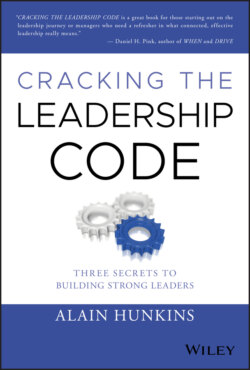Читать книгу Cracking the Leadership Code - Alain Hunkins - Страница 19
LOOKING IN THE MIRROR
ОглавлениеYou don't need to change the world; you need to change yourself.
—Miguel Ruiz
Ultimately, your leadership will be judged by your behavior: what you say and what you do. How you show up as a person is how you show up as a leader. You can't separate the two.
This idea isn't new. About 2,500 years ago, Socrates wrote, “To know thyself is the beginning of wisdom.” “Knowing thyself” has been rebranded as “self-awareness” in our present-day society.
Self-awareness is the foundation of emotional intelligence (EI). It's the basis of creating effective working relationships. After all, if you don't recognize your own drives and actions, how can you begin to understand the drives and actions of others?
Not only is EI essential to lead in today's organizations but also it's the competitive advantage of anyone who aspires to lead. In fact, when IQ and technical skills are roughly similar, EI accounts for nearly 90% of what moves people up the organizational ladder.1
Marshall Goldsmith, considered by many to be the world's preeminent executive coach, wrote a best-selling book called What Got You Here Won't Get You There. If leaders want to continue to develop, he argues, they must grow and change—and the first step of change is self-awareness. You need to hold up the mirror and pay attention. After all, you can't change what you don't see. Self-awareness is the skill that enables you to transform unconscious incompetence or competence into conscious competence. You can't become excellent at anything if you're oblivious as to why and how you do it.
Know thyself. It sounds so easy.
But it's easier said than done. Looking in the mirror is a lot harder than it seems. It takes humility to recognize that what's staring back at you is less than perfect.
We humans have a cognitive bias called illusory superiority. It's the reason that 90% of drivers think their driving skills are above average.2 It's common to overestimate our own abilities relative to others. Looking at our own flaws is hard. Some people find the process of self-examination so uncomfortable that they will repress, hide, or deny the facts. I certainly hid from the truth in the run-up to the election with Gary. However, as ostriches demonstrate so well, putting your head in the sand doesn't make reality go away.
If the idea of change makes you uncomfortable, you're on the right track. Leaders who are committed to developing themselves keep putting themselves in situations outside of their comfort zone. They know it's the only place they will grow.
